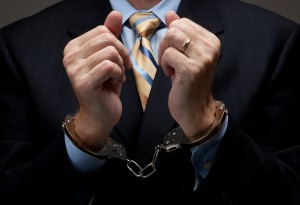The right to remain silent and the right to avoid self-incrimination are basic and foundational to our criminal justice system. Without those rights, “justice” in any meaningful sense is probably impossible. The Fifth Amendment to the Constitution tells us that no person “shall be compelled in any criminal case to be a witness against himself.” That’s why a criminal suspect who is taken into police custody has a “right to remain silent.”
The right to remain silent, although vital, is not absolute. It’s limited. It protects criminal suspects and witnesses from having to answer leading or incriminating questions about themselves, but it does not let you refuse to answer other questions that may be posed by the courts – especially questions about someone else and crimes that person might have committed.
When someone’s testimony about another person – and crimes that person may have committed – might also incriminate the witness, a prosecutor can choose to provide immunity from prosecution in exchange for the testimony. Immunity from prosecution generally means that the government agrees not to prosecute the witness for the crime that he or she might have committed in exchange for the desired testimony or other evidence.
FOR WHICH CRIMES CAN IMMUNITY BE GRANTED?
Prosecutors may elect to offer immunity to a witness when that witness can help them win a conviction. When prosecutors provide a grant of immunity to someone, a number of legal rules automatically and immediately come into play. Immunity from prosecution is a vital tool for prosecutors in New York and elsewhere, who are allowed to offer immunity for even serious crimes like kidnapping and murder. More typically, however, prosecutors will provide immunity to a suspect who has allegedly committed minor crimes in order to obtain testimony against someone who has committed more significant crimes.
Historians tell us that the first immunity statute was adopted by the British Parliament in 1710, and it was quickly copied by the American colonies. The first federal immunity statute in the United States was enacted by Congress in 1857, and it immunized anyone who testified before a congressional committee from prosecution for any matter “touching which” he or she had testified. Several legal questions arose, however, regarding the 1857 law, so in 1893, Congress passed a second immunity statute, this time clarifying the legal distinction between “transactional” immunity and “use” immunity.
In the state of New York, a prosecutor may grant immunity to a witness in either of those two forms. Transactional immunity, also referred to as “blanket” or “total” immunity, entirely shields the witness from any future prosecution for any crimes related to his or her immunized testimony. “Use” and “derivative use” immunity, however, only prevents a prosecutor from using the actual testimony itself or any evidence derived from the testimony as evidence against the witness in a future prosecution.
WHAT DOES THE SUPREME COURT SAY ABOUT IMMUNITY?
In Kastigar v. United States (1972), the U.S. Supreme Court decided which type of immunity, “transactional” or “use” immunity, is constitutionally required to compel testimony from a witness. The Court ruled that the grant of use and derivative use immunity is sufficient to compel testimony. Many states, including New York, choose to go a step beyond what the Constitution requires. In New York, full transactional immunity may be provided to witnesses who give immunized testimony. Prosecutors at the state level may offer a witness either transactional or use and derivative use immunity, but at the federal level, transactional immunity is quite rare.
Witnesses who are compelled by a subpoena to appear and testify before a grand jury are entitled to receive immunity in exchange for their testimony. The grant of immunity for grand jury testimony, however, prevents the witness from invoking his or her Fifth Amendment right against self-incrimination as a legal basis for refusing to testify. Grand jury witnesses may be prosecuted for perjury if they make any false statements in the course of their grand jury testimony.
Any witness who refuses to cooperate with a prosecutor after being provided immunity can be held in contempt of court and penalized with fines and/or time in jail. And even with a grant of immunity, a witness in some cases may not simply walk away “scot-free.” If a prosecutor subsequently seeks a criminal indictment against a previously-immunized witness, the prosecutor will have to demonstrate that the state’s case is based exclusively on evidence developed independently of the immunized testimony.
Someone who faces a prosecution and intends to claim immunity from that prosecution must be able to show that a prosecutor granted immunity and that the immunized testimony directly relates to the new charge. In response, the prosecution must demonstrate that all of the evidence it intends to use against the witness was developed from independent sources. It is not sufficient for the prosecution to simply deny that it is using the immunized testimony. It must prove that the evidence does not arise from the immunized testimony. If none of the evidence is independent of and distinct from immunized testimony, the court will dismiss the case.
CAN IMMUNITY BE WAIVED?
If you have been asked to give immunized testimony in a criminal case in New York, be sure that you protect yourself and consult first with an experienced Long Island criminal defense lawyer. Only a seasoned defense attorney can explain the details regarding immunity in your own situation, ensure that you do not waive immunity if you have it, and protect your other legal and constitutional rights. If you are charged with any felony or misdemeanor in the state of New York, contact a Long Island criminal defense lawyer at once for the advice and legal representation you may need.
Because immunity is a privilege, an immunized witness retains the right to waive that privilege. A witness who has been granted immunity may sign a written statement telling the court that he or she waives any rights linked to immunity. A waiver of immunity also happens automatically when a witness has immunity but does not assert it – for example, by freely answering questions in a courtroom without mentioning previous immunized testimony. However, once immunity has been waived, the government is then able to use the previously immunized testimony against the witness.















Comments are closed.